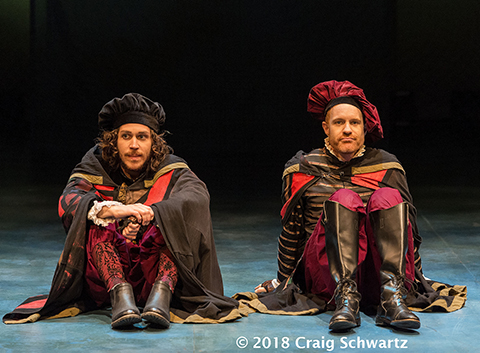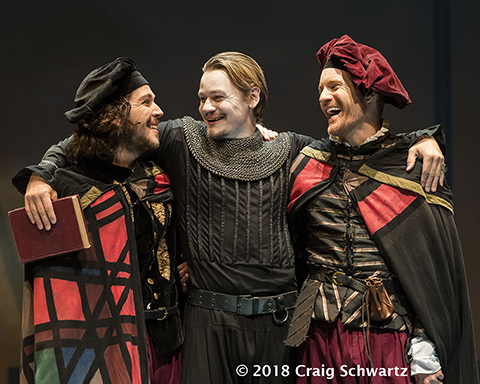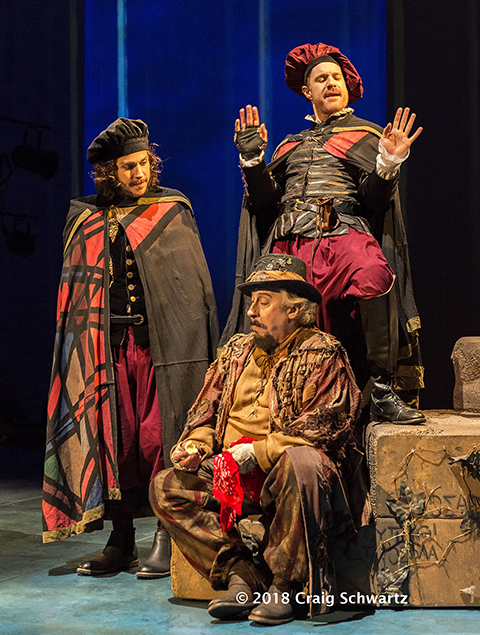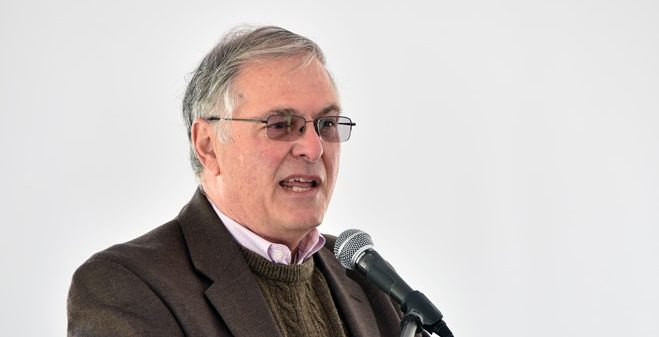
By May S. Ruiz
Tom Stoppard’s ‘Rosencrantz and Guildenstern are Dead’ was first performed at the Edinburgh Festival Fringe (The Fringe) in 1967 to great acclaim. It established him as one of the greatest playwrights in modern times and his work, which puts to the fore two of Shakespeare’s minor characters in ‘Hamlet,’ has been staged throughout the western world.
Pasadenans will get to experience Stoppard’s brilliance when ‘Rosencrantz and Guildenstern are Dead’ goes on stage at A Noise Within from October 7 to November 18. Directed by ANW Producing Director, Geoff Elliott, it stars resident artists Kasey Mahaffy as Rosencrantz and Rafael Goldstein as Guildenstern.
A Nosie Within distinguishes itself as one of the few repertory theatre organizations with a resident company. The resident actors’ genuine regard for one another manifests itself on stage and makes for richer, more nuanced performances.
“Rafael and I have known each other for four years,” Mahaffy discloses. “We know each other’s secrets, we’re two halves of the same coin. So we started the foundation from day one, jumping off from a place that some actors could only be familiar with on opening night.”
“I’ve worked with him in about half a dozen plays and I have admired him greatly as an artist. But our joke was that we never shared a word together. Even in ‘Henry V,’ where he played the king and I was the dauphin from France, his mortal enemy, we didn’t share a minute of stage time. We just never got a moment together. Finally, they threw us a bone. Now all we do is hang out and we’re sick of other,” quips Mahaffy.
“But, seriously, I’m grateful every day that Rafael is my screen partner and my safety net,” Mahaffy says hastily. “He’s incredibly prepared and diligent, which I expected coming in. He’s always fun to hang out with and joke with backstage.”
“What I like about Kasey is that he’s a grounding presence for me,” declares Goldstein. “I tend to spin off into the abyss. And Kasey is very practical; he listens and he responds. Every actor needs that and I have it in spades with him. His sense of humor leavens the existential morass that we find ourselves in in this play. He has all the laugh lines, as well. It’s been nice to sort of play the straight man to his comic character.”
“Like in any true functioning relationship, these two individuals, while widely different, need each other,” Mahaffy elucidates. “Guildenstern is a cerebral, logistical, driven character. And Rosencrantz is all fart jokes. But what’s so cool in Stoppard’s writing is that when one character loses perspective and spins out, and both of us do it multiple times on the show, the other one immediately rises to the challenge and rescues the other. Every single moment in this play is a scale that he and I are leveling.”

‘Rosencrantz and Guildenstern are Dead’ is not new to Mahaffy. “When I was doing my undergraduate thesis back in 2000, I had the role of Guildenstern. It’s amazing to hear those words again 18 years later. The dialogue is just fast, fast, fast, boom, boom, boom, like a tennis match. The problem is, sometimes I say his lines. It’s been 18 years but it sticks in the brain. So one of the great things about playing with him is that he’s shown me how to do that part. And how terribly bad I was when I did it then,” he admits with a laugh.
Goldstein says, “The virtue of him having done it before is that he was able to warn me about the pitfalls of this role too, and how to navigate them. He has something of a map to guide me about the play generally, like how the audience would react. Granted, that would change, but it’s something to have in the back of my head.”
Revisiting the play almost two decades later has given Mahaffy a better, deeper sense of it. “It is the heart of what I want to talk about today. The play, while told through comedy and existential theatrical device, is a treatise on life. More specifically, it is about these two characters who are stuck and are searching for their next move. They’re waiting for signs from the universe, other people, other souls, to tell them what they should do next. Like most of us, they are terrified about mortality and death. When I performed this at 20 years old, I was saying the words but I didn’t have a visceral understanding of their significance.
“This summer, my brother passed away prematurely, at 42 years old, and left a wife and two daughters. My parents were devastated and I’ve been reeling from it since. It made me think about what it means to me as a brother and as a son. As an artist, I have to put my life on stage no matter what’s going on in my life, whether it’s good or bad. There’s the line in the play …”
And Goldstein supplies the line, “There is no applause, there is only silence.”
“Yes. When you die, there is no applause, only silence and second hand clothes,” picks up Mahaffy. “Tom Stoppard is a certifiable genius. You can say those things when you’re in college but it’s not until you’re a 39-year-old man holding your brother’s shoes which were gifted to you … these second-hand shoes … that the gut punch meaning to the lines is actually delivered.”
“The theme of the play is Rosencrantz’s and Guildenstern’s imminent death,” Goldstein addresses further. “They know something is amiss, but they have an inkling, as we all do. We have an understanding that death is coming. And it’s every human’s journey how to reconcile the ultimate irrationality of our own demise. Moving through the world with that knowledge, how does one confront the absurdities of everyday life? How does one control aspects of one’s life to better comprehend the current situation? There is the questioning which activates a lot of philosophical ideas.”
“Tom Stoppard’s characters are people seeking agency in their life,” describes Mahaffy. “He wants to explore the questions ‘Are we subjugated to fate?’ ‘Are we tools at the hand of God?’ ‘Or do we have our own power?’ ‘Are we the captain of our own ship?’ That’s the crux of what he wrote at 26 years old. He was still a baby! Such genius!”

Goldstein enlarges on that thought, “The question, ‘Are we the captain of our ship, or are we set on a predetermined path?’ is completely outside of our understanding and perception. Are we just being moved along inexorably towards a predetermined end and no matter what we do, no matter what flailing action we might take to avoid certainties, we’re going to meet our end? You know, you can do as many push-ups as you want, you’re still gonna die!
“The play focuses on two minor characters in Hamlet. The title comes from a line in it, ‘Rosencrantz and Guildenstern are dead.’ There is no question. But to them, there has to be a possibility of reprieve, which they’re searching for in the entire play.”
Expounds Mahaffy, “The characters are determined to take a grip of their circumstances. They wonder if they should turn right instead of left, forward or backward. They ask The Player, ‘What do we do? We don’t know how to act.’ And The Player answers, ‘Relax. Respond. That’s all we can do as humans.’
“This is a play about language and dialogue. Our set, even as it’s beautifully designed, is quite simple. It’s pretty much a stage with lights. I think it’s going to be a major treat for anyone who appreciates language and humor. And I want to make this clear, you don’t have to know Shakespeare. We don’t speak in Shakespeare vernacular. We talk like two people in 2018. It’s wildly funny and terribly heartbreaking all at once. It’s everything you want theater to be.”
“We’ll be wearing clothes that convey an Elizabethan flavor, but the way we speak to one another in the play is thoroughly recognizable,” Goldstein emphasizes. “Geoff Elliott, our director, has stressed for us to understand the words and communicate them as simply as we can. There is very little varnish to the way we interact with each other. It’s unadorned and straightforward. It’s two people just trying to survive and using the other person as a buoy, or a sounding board. That’s invaluable direction given the philosophical themes of the play. This is undeniably one of the greatest plays in the past century and I think people will come way from the production appreciating that.”
Even if not everyone agrees with Goldstein’s assertion, the one indisputable certainty is that Tom Stoppard didn’t let Rosencrantz and Guildenstern go down without a fight.







